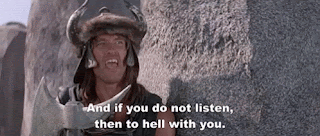Welcome to the field, ripe fruits.
 |
| What is the meaning of the stones? Why do they stand alone? |
Put down your roots and grow here,
Wither and enrich our soil.
Spill your seeds in the delirium of battle.
Alone, here stands Ulster
Against all of golden Eriu, allied—
A division to outlast you.
It pleases us, your offer to pour out your blood
While your fundament fails,
Fertilizing your grave,
And we, ravens, pluck the savory, sightless eyes.
--Gregory Frost, Tain
The ancient Irish were badasses (as are some of the moderns, I know of one Murphy who will soon bloody your lip as buy you a Guinness). As Britain’s kingdoms fell one by one to Viking raiders until Alfred stood alone, the Norsemen were never able to break the men of Ulster. See April 23, 1014 and Clontarf.
When your national mythology is built on the likes of Cu Chulainn, warfare is in your blood.
But Ireland was also riven by internal strife. The same clannish fierceness that made the Celts resistant to Viking incursions turned on itself with petty squabbles and bloody feuds. All the way back to great conflicts fought between the legendary Firbolg and the godlike Tuatha De Danann.
To be honest, my knowledge of Irish Celtic mythology suffers next to classical Greek/Roman and Norse (half of it probably derives from AD&D's Deities and Demigods). But in my defense the Celts don’t have the same well-known body of rich literature as The Elder Edda or The Norse Sagas, or The Iliad, The Odyssey or Ovid’s Metamorphoses. Even Bulfinch’s Mythology, which spends most its page count on Greek and Roman stories, opts to cover Anglo-Saxon myths including tales of Old King Arthur, leaving the Irish cupboard bare.
Thank goodness for Gregory Frost’s Tain, which brings the old stories to life in an unforgettable way.
Deuce Richardson sent me a copy of this somewhat obscure 1986 title (Ace Fantasy, I believe just one printing though it’s now an ebook). And damn, I’m glad he did. It was an excellent read.
Frost breathes life into these old—very old--stories. That’s a bit of a clichéd phrase but apt in this instance. Tain is a book not of dry or distant myths but bright blood and lust and vengeance and humor and cutting wit, told with a compelling modern style.
The women in this book… wow. Certainly three dimensional—lusty, prideful, headstrong, tough, ambitious, ruthless--just like their male counterparts, if not more so. The conflict and subsequent carnage stems from a pissing contest between Maeve, Queen of Connacht, and her husband Ailell. Maeve counts up her possessions against Ailell’s and finds them in balance—save that his herd includes the mystical blood red bull Finnbennach. To rectify this unforgivable sleight she orders a cattle raid on Ulster to steal Finnennach’s equal, the dark bull Donn. The army musters and marches. Standing in their way is the great hero Cu Chulainn, who holds a delaying action until the Ulstermen can get their shit together.
Adding further intrigue and a compelling love triangle is the hero Fergus mac Roich, who is openly sleeping with Maeve (she never turns a warrior away from her bed). Maeve’s advances grow so brazen that Ailell has no choice but to unman Fergus by stealing his legendary sword Leochain (there are many double entendres in this book, a sword is not just a sword, is it?)
Tain dips even further back into Celtic mythology with retellings of the tragedy of the impossibly beautiful Derdriu, the tale of the pigkeepers Friuch and Rucht, and the legend of the Amazon Queen Nessa. Frost connects these disparate stories with an interesting framing sequence: A creature of the faerie folk, Laeg of the Sidhe, emerges from a magic cauldron to show the old stories to the boy Senchan. The two wander through these great events as phantom observers with Laeg providing interpretation and light guidance. This was perhaps a slight weakness of the book but it does the job.
Tain is ripe with atmosphere and brings the Emerald Isle to life. We’re introduced to Cromlechs and sacrifices and torcs and all the cool trappings of the era. The Celtic Triple Goddess of war, fate, and death, the Morrigan--Morrigu, Badb, and Nemain—make a startling appearance on the battlefield. Druids also play a memorable and prominent role, bestowing geases with irresistible effect.
The heart of the book is the cattle raid, which is based on the single surviving example of Irish Celtic epic, the Tain Bo Cuailnge. Cu Chulainn is revealed as one of the great all-time heroes of his or any age, with feats of arms and battle prowess second to none. Codes of combat require that one Connacht hero challenge him at a time, and Cu Chulainn cuts them down like wheat, lopping off heads unnumbered until he encounters his near equal in a shallow river duel… but I won’t spoil it or the wonderous exploits therein. Go read Tain if you can find a copy.


